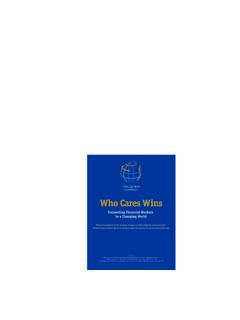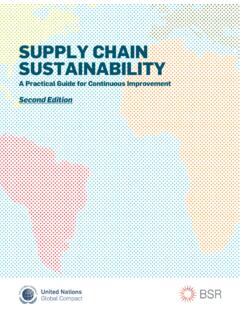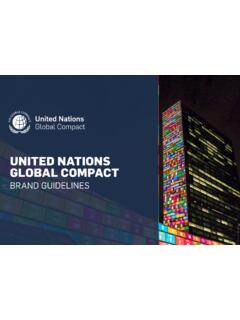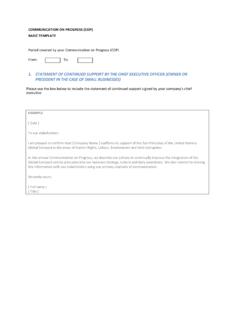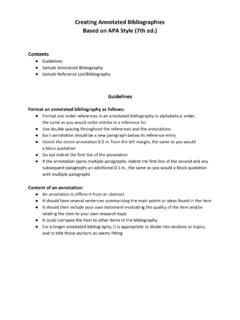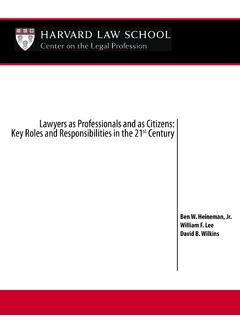Transcription of UN Global CompaCt maNaGemeNt model
1 Framework for ImplementationUN Global CompaCt maNaGemeNt modelHUmaN R the United Nations Global CompactLaunched in 2000, the United Nations Global CompaCt is a call to companies around the world to align their strategies and operations with ten universal principles in the areas of human rights, labour, environment, and anti-corruption, and to take action in support of broader UN goals. With more than 8,000 signatories and stakeholders in more than 135 countries, it is the world s largest voluntary corporate responsibility initiative. UN Global CompaCt Office would like to especially acknowledge the following people for their role in the development of the model and publication: Gavin Power, Ursula Wynhoven, and Ole Lund Hansen from the UN Global CompaCt Office; Julie Engerran and Nick Main from Deloitte Touche Tohmatsu; Eric Hespenheide from Deloitte & Touche LLP; and Christopher Park, David Linich, Karin Kin, and Eric Lowitt from Deloitte Consulting LLP.
2 Design by Cathlyn Robinson from Deloitte Services LP. The UN Global CompaCt Office also wishes to thank Global CompaCt participants and UN agencies for their valuable deloitte Deloitte refers to one or more of Deloitte Touche Tohmatsu, a Swiss Verein, and its network of member firms, each of which is a legally separate and independent entity. Please see for a detailed description of the legal structure of Deloitte Touche Tohmatsu and its member firms. Deloitte provides audit, tax, consulting, and financial advisory services to public and private clients spanning multiple industries. With a globally connected network of member firms in more than 140 countries, Deloitte brings world-class capabilities and deep local expertise to help clients succeed wherever they operate.
3 Deloitte s approximately 169,000 professionals are committed to becoming the standard of publication contains general information only, and none of Deloitte Touche Tohmatsu, its member firms, or its and their affiliates are, by means of this publication, rendering accounting, business, financial, investment, legal, tax, or other professional advice or services. This publication is not a substitute for such professional advice or services, nor should it be used as the sole basis for any decision or action that may affect your finances or your business. Before making any decision or taking any action that may affect your finances or your business, you should consult a qualified professional adviser.
4 None of Deloitte Touche Tohmatsu, its member firms, or its and their respective affiliates shall be responsible for any loss whatsoever sustained by any person who relies on this document is copyright-protected by the United Nations. The reproduction and distribution of this document for information purposes and/or use in participating in the UN Global CompaCt is permitted without prior permission from the Global CompaCt Office. However, neither this document nor any extract from it may be reproduced, stored, translated, or transferred in any form or by any means (electronic, mechanical, photocopied, recorded, or otherwise) for any other purpose without prior written permission from the Global CompaCt of publication Focus area of publication 1 ContentsWelcome Message from Georg Kell 2 Foreword from John Connolly 3 Introduction and Overview 5UN Global CompaCt maNaGemeNt model 8 Step 1: Commit 10 Step 2: Assess 12 Step 3: Define 14 Step 4: Implement 16 Step 5: Measure 18 Step 6: Communicate 20 Conclusion 23 Appendix.
5 UN Global CompaCt Issue Area Support Tools 24 Appendix: Other Important Guidance Materials 26CO MMI AS PL EM EN MM UNI CAT FI the UN Global CompaCt has evolved in countless ways over the past decade, there has been one unshakable and non-negotiable constant the central aim of translating the core ten principles into value-enhancing maNaGemeNt course, we have always recognized that the ten principles and the four issue areas they represent human rights, labour, the environment, and anti-corruption will find expression in different ways, as companies and industries can vary significantly.
6 In this sense, there really is no one-size- fits-all approach. This is also important insomuch as the principles allow for a good deal of innovation and unique application that reflect the realities of a given company s journey towards corporate the same time, the ten universal principles represent the bedrock of performance aspiration for participating companies. And, to be sure, the business case for mainstreaming the principles into strategy, culture, and operations has never been stronger. Experience shows that companies begin engagement in the UN Global CompaCt at very different stages in terms of the arc of sustainability evolution.
7 For learners, the journey ahead can appear arduous and uncertain. Add to this the fact that corporate sustainability is fundamentally about continuous improvement, and even the most sophisticated companies will convey their need for ongoing implementation , it is with great excitement that we officially launch this UN Global CompaCt maNaGemeNt model , developed in partnership with model represents, in our view, the very best maNaGemeNt thinking with respect to translating the UN Global CompaCt s principles into practice. Importantly, it draws on widely accepted and understood maNaGemeNt practices, but is organized and orientated around maximizing corporate sustainability UN Global CompaCt maNaGemeNt model was developed over the course of many months, in consultation with a range of corporate sustainability and maNaGemeNt experts, and leading thinkers from civil society and academia.
8 The model presents a dynamic maNaGemeNt framework, which while perhaps holding special signifi-cance for learners, also offers guidance for leadership practices. In this way, the model is intended for all participants of the UN Global CompaCt and, in fact, offers value to any company committed to corporate sustainability. In this sense, we humbly offer it also as a public is our sincere hope that through the application of the UN Global CompaCt maNaGemeNt model , companies will attain ever-higher levels of performance and, in the process, generate real and lasting value for their business, stakeholders, and society at ,Georg KellExecutive DirectorUN Global CompactWelcome Message from Georg KellUN Global CompaCt maNaGemeNt model 3 Deloitte member firms have the privilege of delivering professional services to many of the world s largest and most successful companies.
9 Through relationships that have often spanned decades. The partners and professionals of the Deloitte member firms work closely with executives, managers, and boards in their efforts to create and protect value for shareholders and other have seen time and again that strong values and principled leadership are crucial to generating long-term rewards for companies. We have also observed a dramatic shift in society s expectations of business: a shift away from the idea that business is only about profit-making ahead of all other motives, and towards the notion that companies must actively foster the social and environmental conditions that make profitability 2000, Deloitte Touche Tohmatsu (DTT) became a founding signatory to the UN Global CompaCt because we recognized that its principles would help orient companies toward a sustainable future.
10 Over the last ten years, Deloitte member firms have integrated the Global CompaCt s ten principles into the way they do business and promoted the Global CompaCt as an instrument for making corporate sustainability a strategic consideration. In preparation for the 2010 Leaders Summit, and in recognition of DTT s tenth anniversary as a founding signatory, we were pleased to collaborate with the Global CompaCt to develop the UN Global CompaCt maNaGemeNt model . Our contribution to the development of the guide draws both from the experiences of Deloitte member firms helping their clients institute change and ongoing dialogue with many of the world s market leading guide supports companies efforts to include the ten principles into their mainstream corporate strategies, operations, and everyday approaches to maNaGemeNt .

